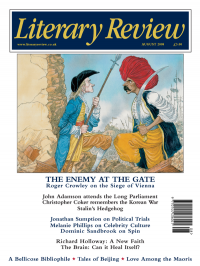Allan Massie
A Bellicose Bibliophile
The Raven King: Matthias Corvinus and the Fate of his Lost Library
By Marcus Tanner
Yale University Press 265pp £20
He was born Matthias Hunyadi in 1440, or perhaps 1443, in Transylvania, in what is now the Romanian town of Cluj, which has also been Kolozsvár (Hungarian) and Klausenburg (Saxon). The Hunyadi family came originally from Wallachia, and his father János Hunyadi was a notable warrior, his life consisting of one almost unbroken crusade against the advancing Ottoman Empire. He drove the Turks out of Transylvania and successfully stormed Belgrade. He died when Matthias was at most sixteen, but the young man grew up to be even more successful, famous and remarkable than his father. In 1458 Matthias was elected King of Hungary, though it took several years of warfare against the Turks, Bohemians, the Habsburg Emperor and the usual bunch of disaffected nobles before he established his authority and could have himself crowned. More wars followed, most of them successful. He drove back the Turks and made himself master of Bosnia, Moldavia and Wallachia – as a result of which successive Popes regarded him, fairly enough, as a champion of Christendom. He fought for years to make himself King of Bohemia, with less success, and near the end of his life, in 1485, drove the Emperor out of Vienna and occupied the city. His mercenary troops, known as the Black Army, were described by Matthias’s court historian, Antonio Bonfini, as ‘braver and more persevering than the Spartans’.
Interesting enough, you may say, but no more so than many thugs who have won battles and built up kingdoms that have disintegrated, as Matthias’s did, within a few years of their death. Even the title of this book – The Raven King – suggests that he was a barbarian

Sign Up to our newsletter
Receive free articles, highlights from the archive, news, details of prizes, and much more.@Lit_Review
Follow Literary Review on Twitter
Twitter Feed
It wasn’t until 1825 that Pepys’s diary became available for the first time. How it was eventually decrypted and published is a story of subterfuge and duplicity.
Kate Loveman tells the tale.
Kate Loveman - Publishing Pepys
Kate Loveman: Publishing Pepys
literaryreview.co.uk
Arthur Christopher Benson was a pillar of the Edwardian establishment. He was supremely well connected. As his newly published diaries reveal, he was also riotously indiscreet.
Piers Brendon compares Benson’s journals to others from the 20th century.
Piers Brendon - Land of Dopes & Tories
Piers Brendon: Land of Dopes & Tories - The Benson Diaries: Selections from the Diary of Arthur Christopher Benson by Eamon Duffy & Ronald Hyam (edd)
literaryreview.co.uk
Of the siblings Gwen and Augustus John, it is Augustus who has commanded most attention from collectors and connoisseurs.
Was he really the finer artist, asks Tanya Harrod, or is it time Gwen emerged from her brother’s shadow?
Tanya Harrod - Cut from the Same Canvas
Tanya Harrod: Cut from the Same Canvas - Artists, Siblings, Visionaries: The Lives and Loves of Gwen and Augustus John by Judith Mackrell
literaryreview.co.uk